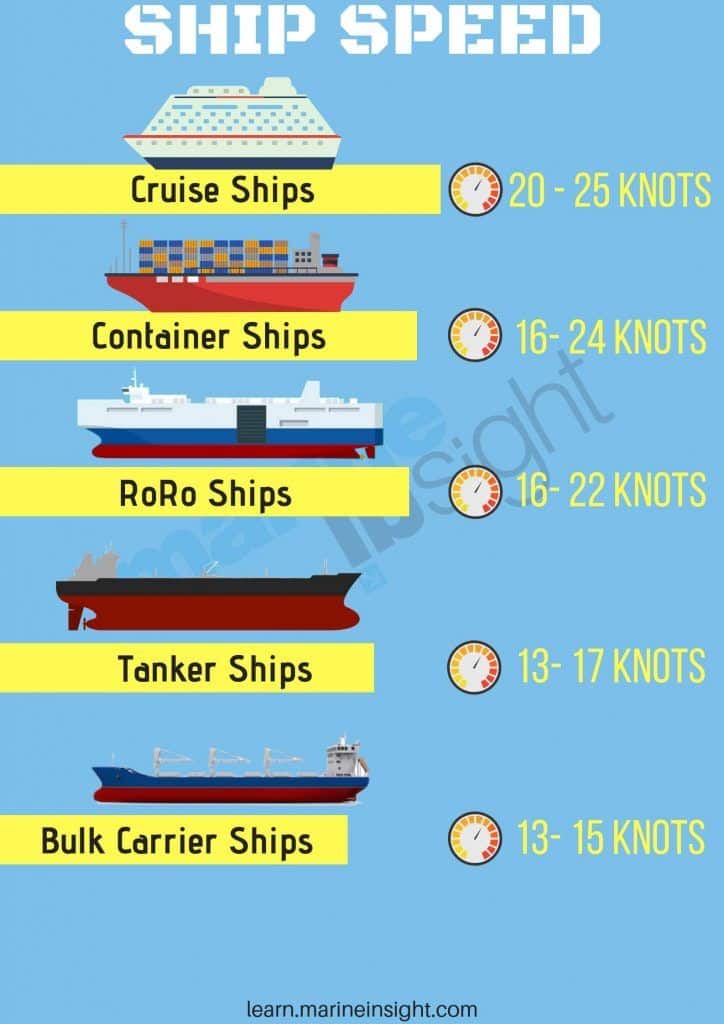
In the past few years, increasing oil prices, adverse market conditions, stringent regulations, and environmental issues in regards to emissions from ships have made it very important to study the importance of the speed of a ship.
Ship’s speed plays a very important role in various environmental factors as well as economic factors for the operator of the vessel.
In this article we will see how, ship speed is measured, what are the various design speeds of different types of cargo vessels, what are the various factors affecting ships speed and why it is important to know and regulate ships speed.
Speed of the ship has a non-linear relationship with fuel consumption; the ship which will go slower will have fewer air emissions than a ship going faster. Speed of the ship has an impact at both design level and operational level.
Ship speed
At the design level, bigger container ships with less speed are being constructed to obtain less CO2 emissions per container. At the operational level, the practice of reducing speed as a response to depressed market conditions and high fuel prices known as slow steaming is being used in almost all commercial shipping sector.
Therefore, it is very important to know the speed of the ship and all the factors affecting the same.
How is the ship’s speed measured?
Ancient seafarers used to measure the speed of the ship by ‘chip log’. It consisted of a log attached to a rope with a number of knots at equal intervals.
The log was dropped in the water at the aft of the ship and one sailor watched the sand empty through 30-second sandglass while others counted the number of knots being passed. The number of knots passed multiplied by the distance between the knots and divided by 30 seconds told them that 1 knot is equal to 1.852 kilometers per hour or 1 knot is equal to 1 nautical mile per hour.
This is how ‘knots’ originated and became a metric system to measure ships speed.
1 knot = 1.852 km/hr or 1 nautical mile = 1.852 km
· 1 Knot
A nautical mile is based on the circumference of the earth and is equal to one minute of latitude. Therefore, it is used by ships in charting and navigation.
These days most ships use GPS to measure the speed of the ship. GPS system consists of a transmitter, receiver and satellite system. This is the most accurate method of measuring the speed of the vessel.
Other methods of measuring speed are using doppler shift and correlation velocity log or CVL.
Doppler shift uses the Doppler effect, which is the relative change in frequency of a wave when the source and the observer are in relative motion. The sound pulse generated by the ship’s motion is reflected off the ocean floor and the same is measured by sonar instruments on a ship.
The CVL uses a combination of multiple transmitters and receivers. Being one of the expensive methods of measuring speed, correlation is generated between signals from different transmitters at different locations and the speed of the ship is calculated.
· Average Speed of Different Types of Ships
Different types of ships have different service speeds.
· Bulk Carriers – 13 to 15 knots
· Container Ships – 16 to 24 knots
· Oil and chemical tankers – 13 to 17 knots
· RORO vessels – 16 to 22 knots
· Cruise Ships – 20 to 25 knots
Different types of ships have different drafts, different cargo, different design and hence accordingly different service speed.
· Different Ship Speed
Factors at the most operational level and design level have to be considered to design the speed of the vessel.
Out of everything consumed on the ship, fuel is the item which costs the most money. Owners want economical ships having lower fuel consumption to sustain in the current world of prevailing oil crises and increasing oil prices. Hence, merchant ships, depending on which cargo they are being designed for along with their route and draft, are constructed to be as economical as possible.
The amount of fuel consumed is very important as it is the most expensive element of transportation by sea for ships.
Fuel consumption is proportional to the displacement of the ship to the power of 2/3 (D^2/3) and the cube of the ship’s speed (V^3).
V here denotes the speed of the vessel in knots and displacement is the weight of water displaced by the volume of the portion of the vessel which is submerged in water.
Here now if displacement is doubled, approximately 1.6 times the power will be required and hence fuel. Otherwise, if the speed of the ship is doubled, eight times the quantity of fuel will be required. From this, we can understand that the effect of the increase in speed is more than the effect of an increase in displacement or the payload for a ship on its fuel consumption.
This shows speed is a critical factor in the operation of a ship. Limitations are imposed on the increase if displacement due to technology, drafts of various vessels at different places and routes like Suez Canal.
The increase in consumption of fuel is quite reasonable per ton in comparison to per knot increase in speed. For every ship, there will be an economical range of speed and displacement with which a prudent shipowner should comply in order to make a profit in a world of see-sawing freight and charter prices which is dependent on the supply and demand of ship tonnage amongst other things.














